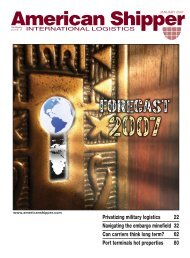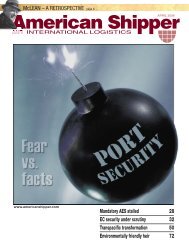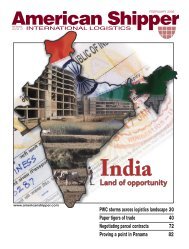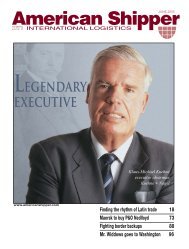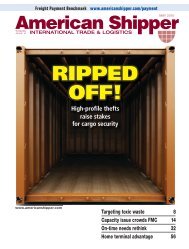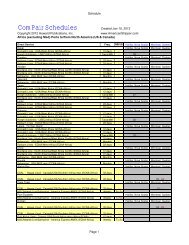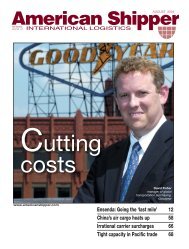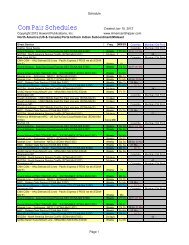Pirate Busters - American Shipper
Pirate Busters - American Shipper
Pirate Busters - American Shipper
Create successful ePaper yourself
Turn your PDF publications into a flip-book with our unique Google optimized e-Paper software.
It’s in the import data<br />
The Consumer Product Safety Commission lacks<br />
direct access to customs information that it could use<br />
to target unsafe imports, according to a congressional<br />
watchdog agency’s report released in August.<br />
With the passage of the 2008 Consumer Product<br />
Safety Improvement Act (CPSIA), Congress sought<br />
to update and strengthen the commission’s authority<br />
over import product safety standards, recalls, reporting<br />
and administrative penalties. The legislation required<br />
the Government Accountability Office to evaluate the<br />
progress of the commission’s implementation of CPSIA.<br />
The GAO found that the commission requires more<br />
access to Customs and Border Protection’s import<br />
manifest records to identify potentially unsafe imports<br />
before they enter the commercial stream.<br />
The commission has traditionally relied on CBP to point<br />
up potentially harmful product imports. However CPSC<br />
is under increased pressure to prevent unsafe products<br />
from entering the United States. In 2007, the discovery<br />
of lead paint in a number of popular children’s toys made<br />
in China thrust the commission into the public and congressional<br />
spotlight.<br />
“CPSC does not have access to key CBP import data<br />
it could use to target incoming shipments for inspection,<br />
and it has not updated its agreements with CBP to clarify<br />
each agency’s roles and responsibilities,” the GAO said.<br />
“CPSC’s activities at U.S. ports could be strengthened<br />
by better targeting incoming shipments for inspection<br />
and by improving CPSC’s coordination with CBP,” the<br />
agency added. “Otherwise, CPSC may not be able to<br />
carry out key inspection activities efficiently or to effectively<br />
leverage its enforcement priorities with CBP.”<br />
The GAO also said CPSC could learn from other<br />
federal agencies, such as the Agriculture Department<br />
and Food and Drug Administration, and other overseas<br />
governments on how to improve its border surveillance<br />
and information sharing with other countries.<br />
Furthermore, the GAO said CPSC “lacks a long-term<br />
plan with key goals” to prevent the entry of unsafe products.<br />
“This may inhibit CPSC’s ability to appropriately<br />
allocate any potential increases in agency resources<br />
or to address the safety of imported products through<br />
international means,” the agency said. — Chris Gillis<br />
BDP’s selective acquisition<br />
The recent acquisition of British firm Rostrum Forwarding<br />
Ltd. by BDP International was not your typical<br />
takeover of a small regional player by a larger one.<br />
In fact, since BDP’s founding in the 1960s by the late<br />
Richard J. Bolte Sr., the Philadelphia-based company has<br />
avoided a growth-by- acquisition model, which is quite<br />
prevalent among many mega-forwarding firms. Instead<br />
BDP has built its global presence by partnering with<br />
other firms that think, look and do business like itself.<br />
BDP has engaged periodically in strategic joint<br />
ventures in which the company has equity interests in<br />
selective markets. On some occasions, BDP has even<br />
gone on to buy the outstanding shares of the joint venture<br />
to take full ownership, such as the case of entities<br />
in Indonesia, Thailand, Germany and Italy.<br />
In general, BDP’s global expansion has included<br />
multiple alliances with small and mid-sized logistics<br />
firms. “Together, with our own extensive global coverage,<br />
we form a web of logistics services that spans the<br />
world to out-hustle our large competitors by delivering<br />
20 AMERICAN SHIPPER: OCTOBER 2009<br />
a more intimate brand of customer service,” said Arnie<br />
Bornstein, a company spokesman, in an interview.<br />
However, the U.K. forwarding market differs from others,<br />
he said. “While BDP doesn’t subscribe to the growth<br />
model of buying up other companies for the sake of seeing<br />
how many BDP logo signs we can hang outside offices<br />
around the globe, the breadth and importance of the U.K.<br />
market to our customers was a priority in our decision<br />
to establish an ownership presence there at this time.”<br />
“Beyond the competitive necessity of having a more<br />
substantive presence in the U.K., it further enhances our<br />
flexibility and service capacity for customers between<br />
the vital market and the world,” said John M. Bolte,<br />
BDP’s chief operating officer, in a July 31 statement.<br />
“The Rostrum-BDP combination culminated nearly<br />
a year of research and due diligence, and it positions us<br />
to be more competitive for our customers as economies<br />
begin to recover,” Bornstein added.<br />
Rostrum’s name will change to BDP International,<br />
but will continue to operate under Rostrum’s Managing<br />
Director Bruce W. Pope. BDP did not disclose terms<br />
of the transaction. In addition to Rostrum’s Dartford,<br />
Kent headquarters, the company has receiving depots<br />
in Birmingham, Bristol, Heathrow, Leeds, London and<br />
Manchester. BDP invested immediately to expand the<br />
operation’s services by opening an office at the London-<br />
Heathrow Airport earlier in July.<br />
BDP said in the United Kingdom it will offer a range<br />
of transportation and logistics services, as well as valueadded<br />
services such as insurance, packing, warehousing<br />
and distribution, and online shipment management and<br />
visibility tools. — Chris Gillis<br />
Nobody’s business<br />
You wouldn’t give your social security number to a<br />
complete stranger on the telephone or write it out on<br />
a survey. Then why would you want to use it on your<br />
commercial export documentation?<br />
The U.S. Census Bureau’s Foreign Trade Division<br />
understands this and has issued an interim final rule to<br />
end the use of social security numbers as identification<br />
when registering and filing electronic export information<br />
in the Automated Export System, or AESDirect.<br />
The current regulations allow the authorized AES<br />
filer to either enter a social security number, employer<br />
identification number (EIN), or Dun and Bradstreet<br />
number (DUNS). Census said social security numbers<br />
are often used by individual filers, whereas businesses<br />
use either the EIN or DUNS. However, the EIN is available<br />
to both businesses and individuals, the agency said.<br />
Census said the rule is being implemented to ensure<br />
that the AES filer is protected in accordance with the 1974<br />
Privacy Act. The problem with using a social security<br />
number as an AES filer identification is that the information<br />
could end up on commercial shipping documents, if<br />
an AES or AESDirect downtime citation is ever required.<br />
Under the interim rule, the AES filer, also called the<br />
“U.S. principal party in interest,” must obtain an EIN<br />
through the Internal Revenue Service. Those filers who<br />
want to use a DUNS rather than the EIN must first obtain<br />
an EIN for identification purposes, the agency said.<br />
The interim rule, which was published in the Aug.<br />
5 Federal Register, takes effect Sept. 4, but the agency<br />
will accept comments about the change through Oct. 5.<br />
Census plans to implement the provisions of the rule on<br />
Dec. 3. — Chris Gillis



